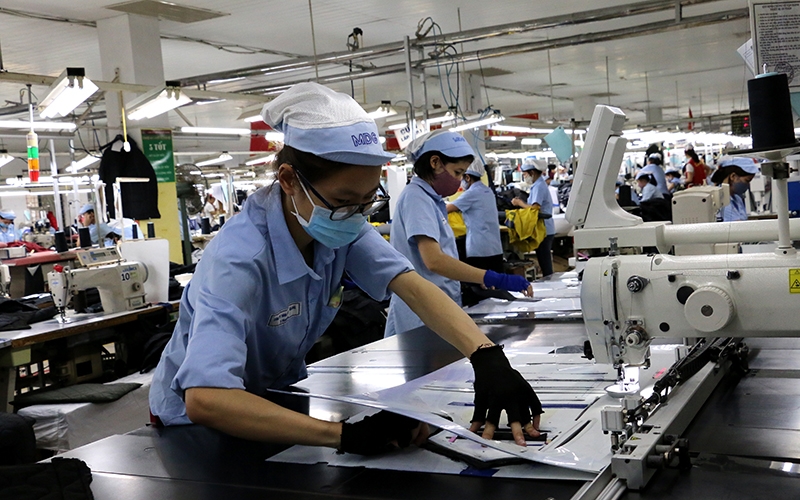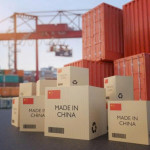Total number of posts 463.
 The increasing number of orders in the early days of 2022 has been creating a new impulse for textile and garment enterprises to boost production and expand their export markets. The positive signal of the market and the initial control of the COVID-19 pandemic will help Vietnam's textile and garment industry fulfil its set export target of over 43 billion USD for 2022.
The increasing number of orders in the early days of 2022 has been creating a new impulse for textile and garment enterprises to boost production and expand their export markets. The positive signal of the market and the initial control of the COVID-19 pandemic will help Vietnam's textile and garment industry fulfil its set export target of over 43 billion USD for 2022.
Currently, most businesses have orders to make until the end of the second quarter and are continuing to negotiate and sign contracts for the third quarter and the remaining months of the year. In addition to traditional orders, enterprises are also making many new orders with high added value and short delivery time in accordance with market trends.
Efforts to overcome difficulties
2021 was a year of piled up difficulties for textile and garment enterprises due to the supply disruption, labour shortage, costs for implementing “three-on-the-spot” production model, the movementof orders and others caused by the COVID-19 pandemic.
Le Hoang Anh, director of Phu Cuong Yarn Factory in Dong Nai, a branch of the Vietnam National Textile and Garment Group (VINATEX), said that more than three months of the “escalating” pandemic, the factory had to implement the “three-on-the-spot” production model with huge costs but can only run at 40% of its capacity to retain partners.
In addition to the huge costs of accommodation for employees, COVID-19 testing, and late delivery fees, the factory also had to face the unpredictable situation that if just one positive case for COVID-19 is discovered, the factory will have to stop operating. Fortunately, that time has passed, and Phu Cuong factory achieved revenue of more than VND 391 billion and a profit of VND 50 billion in 2021.
“It is forecast that the yarn market this year is not as good as last year, but the factory is also preparing scenarios to adapt to the market's movements. At the same time, the factory will continue to find ways to increase productivity and income so that employees can feel secure to work and stick with the factory for a long time,” said Director Le Hoang Anh.
Phong Phu Corporation in Ho Chi Minh City was also seriously affected by the pandemic, especially in the third quarter of 2021 when total number of orders decreased by 42%. The revenue of Phong Phu in 2021 was equivalent to 79.3% of 2020, but profit after tax reached 108.5% of that in 2020. The company will continue to promote exports to established markets such as Japan, the Republic of Korea, and ASEAN in 2022 and to markets where Vietnam has competitive advantages, such as the US and Australia, as well as aiming to penetrate into the global supply chain.
Towards high value products
General Director of VINATEX Southern Corporation (VSC) Nguyen Hung Quy said that the company was heavily affected by the pandemic last year, but thanks to the location of three factories in the provinces of Bac Lieu, Can Tho and Kien Giang, the company can recruit worker migrants returning to the western regions to avoid the pandemic. VSC has been building a safe working environment system and creating good income for workers to expand production.
General Director of Hung Yen Garment Corporation (Hugaco) Pham Thi Phuong Hoa said that the company faced many difficulties last year due to the pandemic while the number of orders decreased in both value and profit and the production sometimes only broke even.
Overcoming difficulties, the parent company's revenue last year rose 10% and profit expanded by 5% compared to 2020. This year, Hugaco is striving to maintain the same level of revenue and profit as the previous year and looking to expand by 5% thanks to the production of FOB orders for the US and Australian markets and taking advantage of the opportunities brought by new-generation free trade agreements (FTAs).
To prepare for FOB orders, Hugoco has prepared resources as well as adjusted production lines and improved skills for employees to be ready to meet valuable orders with fast delivery time at the request of partners.
According to Vinatex General Director Cao Huu Hieu, the positive signal of the market along with abundant orders in the first months of the year is favourable conditions for enterprises to promote production and export of goods. Vinatex has developed a strategy and provided market solutions to help member units boost exports of textiles and garments in the coming time.
The group will focus on digital transformation in particular, considering this as the key to successfully realising the group's strategic goals for the 2022-2025 period – becoming a destination to provide all-inclusive packages for customers' needs in the global supply chain, Hieu noted. On the other hand, Vinatex will form a cluster of yarn, textile, dyeing and sewing enterprises to share production capacity and create a complete linkage chain. The textile and garment industry determines the export rate of about 70% through strengthening linkages to the global production chain and distributing directly to textile and dyeing manufacturers so that 50% of the exported yarn can join the chain.
In addition, the industry will strengthen the design and marketing capacity and proactively shift to OEM (original equipment manufacturer) and ODM (original design manufacturing) production methods to gain high added value.
According to Vice President and General Secretary of the Vietnam Textile and Apparel Association (Vitas) Truong Van Cam, although the pandemic situation remains complicated, positive signals from major markets such as the US and the EU and the increase in consumer demand are ideal conditions for businesses to boost the export of goods.
If the pandemic is soon put under control, the target to achieve total export turnover of about 42 - 43.5 billion USD in 2022 will soon be realised. However, in addition to their own efforts, garment and textile enterprises expressed their hope that the State will have specific support policies to encourage the development of supporting industries and investment as well as forming export encouragement funds and financial support to improve the competitiveness of enterprises in the international market.
Source: Nhan Dan Online














